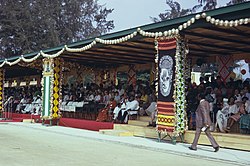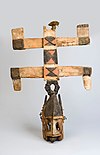Portal:Pan-Africanism
IntroductionWelcome to the Pan-Africanism portal!
Bienvenue sur le portail panafricanisme!   Pan-Africanism is a worldwide movement that aims to encourage and strengthen bonds of solidarity between all indigenous peoples and diasporas of African ancestry. Based on a common goal dating back to the Atlantic slave trade, the movement extends beyond continental Africans with a substantial support base among the African diaspora in the Americas and Europe. Pan-Africanism can be said to have its origins in the struggles of the African people against enslavement and colonization and this struggle may be traced back to the first resistance on slave ships—rebellions and suicides—through the constant plantation and colonial uprisings and the "Back to Africa" movements of the 19th century. Based on the belief that unity is vital to economic, social, and political progress, it aims to "unify and uplift" people of African ancestry. (Full article...) Selected articleThe Organisation of African Unity (OAU; French: Organisation de l'unité africaine (OUA)) was established on 25 May 1963 in Addis Ababa, Ethiopia with 32 signatory governments. It was disbanded on 9 July 2002 by its last chairperson, South African President Thabo Mbeki, and replaced by the African Union (AU). Some of the key aims of the OAU were to encourage political and economic integration among member states, and to eradicate colonialism and neo-colonialism from the African continent. Although it did achieve some success, there were also differences of opinion as to how that was going to be achieved. Selected biography
Frances Cress Welsing (née Cress; March 18, 1935 – January 2, 2016) was an American Afrocentrist and psychiatrist. Her 1970 essay, The Cress Theory of Color-Confrontation and Racism (White Supremacy), offered her interpretation on the origins of what she described as white supremacy culture. She was the author of The Isis Papers: The Keys to the Colors (1991). Welsing caused controversy after she said that homosexuality among African-Americans was a ploy by white males to decrease the black population. Selected history
Traditional African religions have faced persecution from the proponents of different ideologies. Adherents of these religions have been forcefully converted to Islam and Christianity, demonized and marginalized. The atrocities include killings, waging war, destroying of sacred places, and other atrocious actions. After the establishment of Islam, its rapid expansion and conquests displaced traditional African religions either by conversion or conquest. Traditional African religions have influenced Islam in Africa, and Islam is considered as having more commonality with traditional African religions, but conflict has occurred, especially due to Islam's monotheistic stance and the rise of Muslim reformers such as Askia. In the Senegambia region, the Serer people who held "a strong connection to their ancient religious past" became the targets of Islamic jihads and persecution from the 11th to the 19th-century resulting in the Battle of Fandane-Thiouthioune. Traditional African religions are tolerant of other gods, which allows general co-existence for multiple religions. This has been regarded by some authors to be another reason behind the rise of other religions in Africa. Most followers of traditional religions accommodated Islam during the start of its spread in Africa, but in West Africa, it was not until the coming of colonialism that Islam gained mass appeal, transforming even groups with historical animosity towards Islamic domination into Muslim communities. In many instances, conflicting groups chose to align with Muslim armies against other African communities.
Quotes
Selected cultureAfrican-American culture, also known as Black American culture, refers to the contributions of African Americans to the culture of the United States, either as part of or distinct from mainstream American culture. The distinct identity of African-American culture is rooted in the historical experience of the African-American people, including the Middle Passage. The culture is both distinct and enormously influential on American and global worldwide culture as a whole. African-American culture is primarily rooted in West and Central Africa. Understanding its identity within the culture of the United States it is, in the anthropological sense, conscious of its origins as largely a blend of West and Central African cultures. Although slavery greatly restricted the ability of African Americans to practice their original cultural traditions, many practices, values and beliefs survived, and over time have modified and/or blended with European cultures and other cultures such as that of Native Americans. African-American identity was established during the slavery period, producing a dynamic culture that has had and continues to have a profound impact on American culture as a whole, as well as that of the broader world. Elaborate rituals and ceremonies were a significant part of African Americans' ancestral culture. Many West African societies traditionally believed that spirits dwelled in their surrounding nature. From this disposition, they treated their environment with mindful care. They also generally believed that a spiritual life source existed after death, and that ancestors in this spiritual realm could then mediate between the supreme creator and the living. Honor and prayer was displayed to these "ancient ones", the spirit of those past. West Africans also believed in spiritual possession. Selected imagesOrganisationsAll-African People's Revolutionary Party · African Society for Cultural Relations with Independent Africa · African Unification Front · African Union · African Queens and Women Cultural Leaders Network · Conseil de l'Entente · Convention People's Party · East African Community · Economic Freedom Fighters · Global Afrikan Congress · International African Service Bureau · International League for Darker People · Organisation of African Unity · Pan African Association · Pan-African Congress · Pan Africanist Congress of Azania · Rassemblement Démocratique Africain · Pan Africa Chemistry Network · Pan African Federation of Accountants · Pan-African Freedom Movement for East and Central Africa · Sahara and Sahel Observatory · UNIA-ACL · ZANU–PF
See also
& Festivals Photo by Helinä Rautavaara (1977) Publications
Films and TVAudios and videosDid you knowArchbishop Desmond Tutu and Thabo Mbeki, former President of South Africa. ... Selected quotesIn addressing the first ever conference of the Organization of African Unity (1st May 1963). The Gambian Pan-Africanist and nationalist Alieu Ebrima Cham Joof delivered the following message:
Pan-Africanism topicsCategoriesThings you can do
Related portalsAssociated WikimediaThe following Wikimedia Foundation sister projects provide more on this subject:
Discover Wikipedia using portals | |||||||||||||||||||||||||||||||||||||||||||||||||||||||||


































